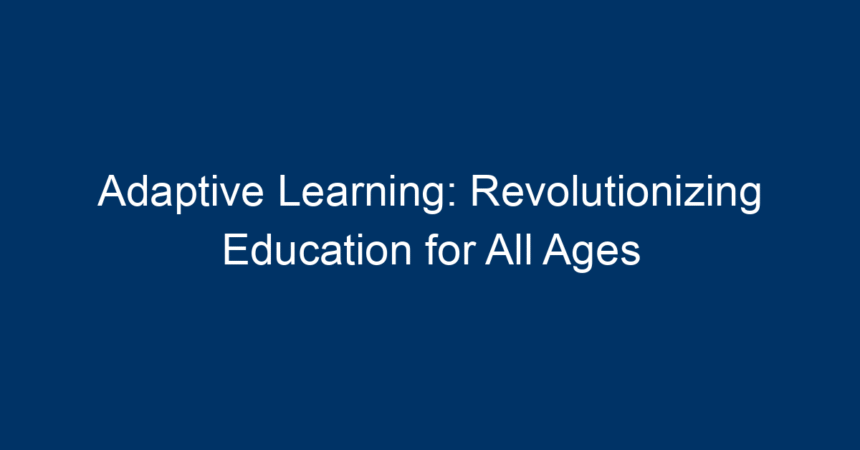In an age where technology continually reshapes our lives, education is no exception. Traditional learning methods, often rigid and one-size-fits-all, are giving way to more personalized approaches. Among these, adaptive learning stands out as a game-changer. By leveraging data, technology, and a nuanced understanding of individual learning styles and paces, adaptive learning is not just transforming how we teach; it is revolutionizing education for learners of all ages.
What is Adaptive Learning?
Adaptive learning refers to educational technologies that adjust the content, pace, and assessment based on individual learner needs. Using algorithms and analytics, adaptive learning systems assess a student’s strengths, weaknesses, preferences, and progress in real-time. This tailored approach ensures that learners receive appropriate support at the right time, making education more effective and engaging.
Key Features of Adaptive Learning
-
Personalization: Adaptive learning platforms customize the learning experience for each student. This means that content can be modified according to a learner’s prior knowledge, interests, and learning pace.
-
Real-Time Feedback: One of the most significant advantages of adaptive learning is its ability to provide immediate feedback. Learners can instantly see the results of their efforts, enabling them to adjust their strategies accordingly.
-
Data-Driven Insights: Adaptive learning systems collect vast amounts of data, allowing educators to gain insights into student performance. This information can help identify gaps in knowledge and inform instructional strategies.
- Engagement: By catering to individual learning styles, adaptive learning tends to hold learners’ attention longer. Interactive content, gamified elements, and personalized challenges make the learning experience more enjoyable.
The Importance of Adaptive Learning in Modern Education
1. Learning at Individual Paces
One of the fundamental principles of adaptive learning is acknowledging that no two learners are alike. Traditional classrooms often force students to learn at a set pace, which can disengage those who are either ahead of the curve or struggling. Adaptive learning addresses this issue by allowing students to move through material at their own speed.
For instance, a student who grasps a concept quickly can advance while another who needs more time receives additional support. This leveling of the playing field is crucial for accommodating diverse learning speeds.
2. Supporting Diverse Learning Styles
Every student has a unique way of processing information. Some excel in visual learning, while others prefer auditory or kinesthetic methods. Adaptive learning systems can tailor content to align with these varying styles.
Research shows that learners retain information better when they engage with material in a format that suits them best. By adapting to individual preferences, educators can enhance comprehension and retention.
3. Increasing Access to Education
Adaptive learning is not just a tool for improving existing educational frameworks; it also expands access to education. For learners in remote areas or those with disabilities, adaptive learning platforms can offer quality education through online means.
This democratization of learning enables everyone, regardless of geographical location or personal circumstances, to engage with educational content tailored specifically for them.
Technologies Behind Adaptive Learning
1. Artificial Intelligence and Machine Learning
At the heart of adaptive learning are powerful technologies such as artificial intelligence (AI) and machine learning (ML). These technologies enable systems to learn from user interactions and improve over time. As a student engages with the platform, the system analyzes their performance and modifies the content accordingly.
2. Data Analytics
Data analytics plays a crucial role in the effectiveness of adaptive learning. By collecting and analyzing student data, educators can identify patterns and trends. This allows for proactive intervention, ensuring that students receive the support they need before falling behind.
3. Learning Management Systems (LMS)
Many educational institutions are integrating adaptive learning into their existing Learning Management Systems (LMS). By incorporating adaptive learning modules into these platforms, educators can seamlessly track student progress and deliver personalized experiences without overhauling their entire curriculum.
Benefits of Adaptive Learning
Enhanced Student Outcomes
Data indicates that students engaged in adaptive learning environments often achieve higher outcomes compared to traditional learning methods. The personalized approach ensures that each learner’s unique needs are met, resulting in improved understanding and retention of material.
Increased Motivation and Engagement
When students feel that their needs are being recognized and addressed, their motivation levels rise. Adaptive learning helps in creating a positive learning environment where students are eager to participate and delve deeper into the subject matter.
Better Resource Allocation for Educators
Adaptive learning systems also empower educators. With data-driven insights, teachers can identify which students require additional support or advanced challenges, thus enabling more effective allocation of their time and resources.
Challenges in Implementing Adaptive Learning
While the benefits of adaptive learning are compelling, various challenges exist:
1. Infrastructure Costs
Implementing adaptive learning technologies can be expensive. Schools and institutions may need significant investment in software, hardware, and training.
2. Data Privacy Concerns
As adaptive learning relies heavily on data collection, there are concerns related to student privacy. Institutions need to have robust measures in place to protect sensitive information.
3. Resistance to Change
Many educators are accustomed to traditional teaching methods and may resist adopting new technologies. Professional development and training are essential for helping teachers navigate this transition.
Future Trends in Adaptive Learning
1. Increased Integration of Virtual and Augmented Reality
The future of adaptive learning may include immersive experiences through virtual and augmented reality. This can provide learners with practical, real-life simulations tailored to their individual pace and style.
2. Expanding Beyond Traditional Education
Adaptive learning is projected to expand beyond K-12 and higher education. Corporate training and lifelong learning environments will increasingly adopt adaptive learning strategies to facilitate continuous improvement and skill development.
3. Enhanced AI Capabilities
As AI technologies evolve, adaptive learning systems will become even more sophisticated. They will be capable of providing deeper insights into student performance, facilitating even more effective learning experiences.
Conclusion: Embrace the Change
The evolution of adaptive learning signifies a shift towards a more personalized, efficient, and engaging educational landscape. By adapting to individual needs, education can become more accessible, equitable, and effective for everyone, regardless of age or background.
Actionable Insights
-
For Educators: Embrace adaptive learning tools and technology to enhance your teaching practices. Invest time in ongoing professional development to understand these systems fully.
-
For Institutions: Consider the long-term benefits of implementing adaptive learning solutions, both for students and educators. Invest in infrastructure that supports sustainable and adaptable learning environments.
- For Learners: Take charge of your learning journey! Explore adaptive learning platforms that can provide you with a personalized and engaging educational experience.
In this era of technological advancement, adaptive learning emerges not just as an option but as a necessity for preparing learners for the challenges of the 21st century. By recognizing the diverse needs of students and adapting educational practices accordingly, we can truly revolutionize education for all ages.




